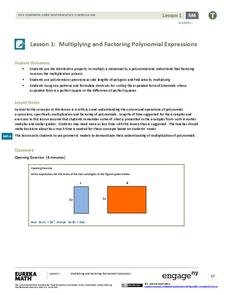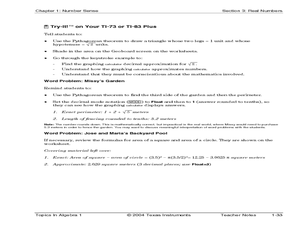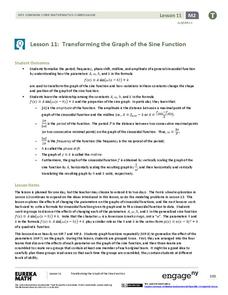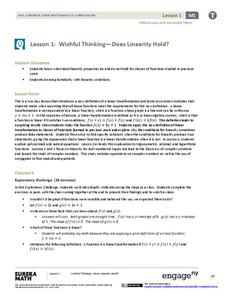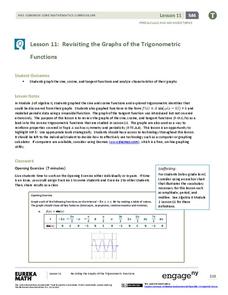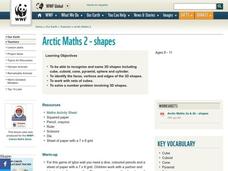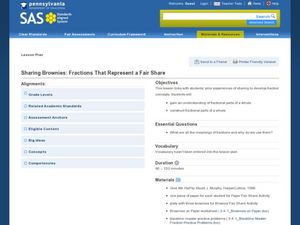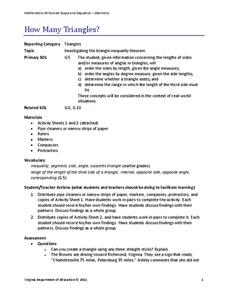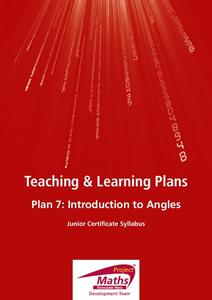Curated OER
Multiplying Fractions Times Whole Numbers
Multiplying fractions by whole numbers is the focus of the math lesson presented here. There are three activities outlined in the lesson along with a nifty game learners play on the computer that reinforces their learning. These lessons...
EngageNY
Multiplying and Factoring Polynomial Expressions (part 1)
Polynomial multiplication and factoring go hand in hand. Why not teach them together. This resource begins with an area model for distributing a monomial and then connects the process to factoring the GCF. Learners then advance to...
EngageNY
Addition and Subtraction Formulas 2
Knowing the addition formulas allows for the calculations of double and half formulas. The fourth installment of 16 has the class use the addition formula to develop the double angle trigonometric formulas. Using the double formula,...
Curated OER
Global Warming
A series of independent learning activities teaches learners about global warming as it relates to economics and industrialization. The culminating project requires them to create a multimedia presentation identifying the problems,...
Curated OER
Number Sense: Real Numbers
Using a scientific calculator and an 11-page guide sheet, middle schoolers investigate real numbers and problem-solving properties. The publisher links this resource to Common Core standard for seventh grade math, but you may find...
Curated OER
Does Your Field Measure Up
Young scholars measure angles using a plane table kit. In this geometry lesson, students use trigonometric identities to find the values of the length of a football field.
EngageNY
Why Call It Tangent?
Discover the relationship between tangent lines and the tangent function. Class members develop the idea of the tangent function using the unit circle. They create tables of values and explore the domain, range, and end behavior of...
EngageNY
Transforming the Graph of the Sine Function
Build a solid understanding of trigonometric transformations through exploration. Learners work in teams to analyze the effects of different algebraic components on the graph of a sine function.
EngageNY
Euler’s Number, e
Scholars model the height of water in a container with an exponential function and apply average rates of change to this function. The main attraction of the lesson plan is the discovery of Euler's number.
EngageNY
Solution Sets for Equations and Inequalities
How many ways can you represent solutions to an equation? Guide your class through the process of solving equations and representing solutions. Solutions are described in words, as a solution set, and graphed on a number line....
EngageNY
Wishful Thinking—Does Linearity Hold? (Part 1)
Not all linear functions are linear transformations — show your class the difference. The first instructional activity in a unit on linear transformations and complex numbers that spans 32 segments introduces the concept of linear...
EngageNY
Revisiting the Graphs of the Trigonometric Functions
Use the graphs of the trigonometric functions to set the stage to inverse functions. The instructional activity reviews the graphs of the basic trigonometric functions and their transformations. Pupils use their knowledge of graphing...
EngageNY
Addition and Subtraction Formulas 1
Show budding mathematicans how to find the sine of pi over 12. The third instructional activity in a series of 16 introduces the addition and subtraction formulas for trigonometric functions. Class members derive the formulas using...
Curated OER
Exploring Expressions
Examine parts of an expression in this algebra lesson. Ninth graders identify the properties of the coefficient and their behavior to the graph. They graph the equation on a TI to see their results.
World Wildlife Fund
Shapes
Investigate the properties of three-dimensional figures with this Arctic-themed math lesson plan. Beginning with a class discussion about different types of solid figures present in the classroom, young mathematicians are then given a...
Illustrative Mathematics
Placing a Square Root on the Number Line
There are many ways to approach finding the rational approximation of an unknown square root. Here is a problem that will help math learners make a connection between square roots and their order on a number line. As usual, determine two...
Curated OER
Designing a Playground!
Students design their own playground equipment. In this design lesson plan, students take pictures of equipment they like and make a class pictograph of their favorite ones. They investigate the design, research equipment around the...
Curated OER
Sharing Brownies: Fractions That Represent a Fair Share
Elementary graders discover the concept of fractional pieces of a whole. They investigate the meanings of fractions in everyday life and why they are used. Pupils divide brownies amongst each other to demonstrate the use of fractions...
Curated OER
Don't Bet The House On It!
Great real-world math application! Have the class compare and contrast their estimated home price and income data with actual data. In groups, they participate in simulations to discover how the housing market and mortgages operate....
Curated OER
Attack of the Raging River
Students explore mass and volume. In this mass and volume lesson, students pretend to be on a hike and have lost their way. Students must cross a river get back on track. Students must use mass, volume, surface area, density, property...
Curated OER
Systems of Equations and Real Life
What a great classroom resource! The intention of this lesson is to show that real-world math can and should be applied to the community in which your students reside. The class relates properties of equations to solving for species...
Virginia Department of Education
How Many Triangles?
Something for young mathematicians to remember: the sum of any two sides must be greater than the third. Class members investigates the Triangle Inequality Theorem to find the relationship between the sides of a triangle. At the...
Project Maths
Introduction to Angles
Approach the lesson plan from the right angle. A discussion-based lesson plan leads helps learners understand angles in terms of rotation. Individuals use manipulatives to explore the properties of angles and learn how to name them. The...
EngageNY
How Do Dilations Map Angles?
The key to understanding is making connections. Scholars explore angle dilations using properties of parallel lines. At completion, pupils prove that angles of a dilation preserve their original measure.

